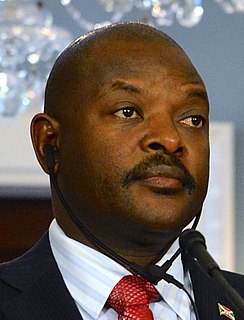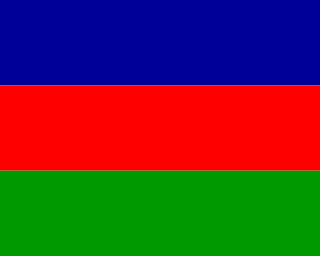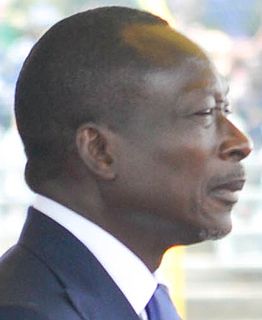
Politics of Burundi takes place in a framework of a transitional presidential representative democratic republic, whereby the President of Burundi is both head of state and head of government, and of a multi-party system. Executive power is exercised by the government. Legislative power is vested in both the government and the two chambers of parliament, the Senate and the National Assembly.

Burundi is one of the few countries in Africa, along with its closely linked neighbour Rwanda among others, to be a direct territorial continuation of a pre-colonial era African state.
Domitien Ndayizeye is a Burundian politician who was President of Burundi from 2003 to 2005. He succeeded Pierre Buyoya, as president on 30 April 2003, after serving as Buyoya's vice president for 18 months. Ndayizeye remained in office until succeeded by Pierre Nkurunziza on 26 August 2005.

The National Council for the Defense of Democracy–Forces for the Defense of Democracy is the current ruling party in Burundi. During the Burundian Civil War, the CNDD-FDD was the most significant rebel group active and became a major political party in Burundi. In March 2012, Pascal Nyabenda was elected as President of CNDD-FDD. Then on 20 August 2016, General Evariste Ndayishimiye was, in the extraordinary congress that took place in Gitega, elected as the Secretary General of the Party.

Pierre Nkurunziza is a Burundian politician who has been President of Burundi since 2005. He was the Chairman of the National Council for the Defense of Democracy-Forces for the Defense of Democracy (CNDD-FDD), the ruling party, until he was elected as President of Burundi.
Martin Nduwimana was the First Vice-President of Burundi from 29 August 2005 to November 2007. He is an ethnic Tutsi member of the Union for National Progress (UPRONA) party.

The National Council for the Defense of Democracy is a political party in Burundi.
Alexis Sinduhije is a Burundian journalist and politician. After founding Radio Publique Africaine during the Burundi Civil War, Sinduhije received a CPJ International Press Freedom Award and was named to the Time 100 list of most influential people. In 2007, he left journalism to run for president, but was arrested in 2008 on a charge of "insulting the president," Pierre Nkurunziza, drawing protests on his behalf from the U.S., U.K., and Amnesty International. He was found not guilty and released in 2009. The film "Kamenge, Northern Quarters" follows Sinduhije before, during, and after his incarceration.

Parliamentary elections were held in Burundi on 23 July 2010. The opposition parties boycotted the election after also boycotting the presidential election.

Presidential elections were held in Burundi on 28 June 2010. As a result of withdrawals and alleged fraud and intimidation, incumbent President Pierre Nkurunziza was the only candidate.

This national electoral calendar for the year 2015 lists the national/federal direct elections held in 2015 in all sovereign states and their dependent territories. By-elections are excluded, though national referendums are included.

Parliamentary elections were held in Burundi on 29 June 2015. The vote had been initially set for 5 June 2015, alongside local elections, but it was delayed due to unrest. Indirect elections to the Senate occurred on 24 July.

Presidential elections were held in Burundi on 21 July 2015. President Pierre Nkurunziza ran for a third term despite controversy over whether he was eligible to run again. The opposition boycotted the vote, and Nkurunziza won re-election.

On 25 April 2015, the ruling political party in Burundi, the National Council for the Defense of Democracy – Forces for the Defense of Democracy (CNDD-FDD), announced that the incumbent President of Burundi, Pierre Nkurunziza, would run for a third term in the 2015 presidential election. The announcement sparked protests by those opposed to Nkurunziza seeking a third term in office.

Presidential elections were held in Benin on 6 March 2016, having been delayed by one week due to logistical constraints. Incumbent President Thomas Boni Yayi was at the end of his second presidential term and was constitutionally barred from running for a third. The elections grabbed the interest of many of the country's top businessmen, resulting in over 30 candidates running for the presidency. A second round was held on 20 March, in which businessman Patrice Talon defeated Prime Minister Lionel Zinsou.

Independents of Hope is a political alliance in Burundi.

A constitutional referendum was held in Burundi on 17 May 2018. The proposed amendments to the constitution were approved by over 70% of voters.











